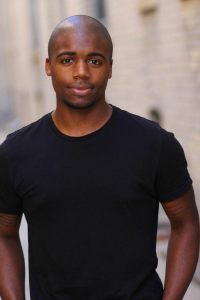
Josh Wilder’s work has been developed at The Fire This Time Festival, Playwrights’ Center, Pillsbury House+Theater, The History Theatre, New York Theatre Workshop, The Drama League, Oregon Shakespeare Festival and The O’Neill National Playwrights Conference.
His play Leftovers was a recipient of the 2014 Holland New Voices Playwright Award at The Great Plains Theatre Conference. He is a former Jerome Fellow and Many Voices Fellow at The Playwrights’ Center and has been in residence at The Royal Court Theatre. Josh is an MFA candidate in Playwriting at Yale School of Drama and received a BFA in acting from Carnegie Mellon.
What was your inspiration for this play?
So many things inspired me to write LEFTOVERS. I think the pursuit of happiness and the struggle to achieving our dreams is what made me write this play. Growing up in the inner city as a young Black man I felt like my dreams and my environment were at war. Growing up, I’ve witnessed so many smart and talented people become casualties in this pursuit to be their ideal selves. Writing this play helped me understand why people in my neighborhood gave up and it helped me heal the wounds I accumulated in the pursuit of my own dreams and it made me understand why I loved The Cosby Shows much.
What projects are you working on now?
Right now I’m working on a political comedy called SALT PEPPER KETCHUP. It’s a play about gentrification and food politics set in a Chinese Take-Out in South Philly.
What playwrights inspire you?
August Wilson, Thornton Wilder, Edward Albee, Steven Adly Guirgis, Quiara Hudes, Sophocles, Shakespeare, Anna Deavere Smith, Lynn Nottage, Tracy Letts, Marcus Gardley––that’s just the tip of the iceberg!
Why did you start writing plays?
While I was at Carnegie Mellon training to be an actor I felt like I had more to offer as an artist. I felt like acting wasn’t the right outlet for my voice. Once I got past the bulk of my training, I wrote my first solo performance and performed it. It all just clicked. From that moment on I knew that my writing was something that I had to pay more attention to. When I got a Jerome Fellowship and moved to Minneapolis to be in residence at The Playwrights’ Center I knew that writing plays were the ultimate calling for me. I became a playwright at The Playwrights’ Center.
What kind of theatre excites you?
My first time seeing a professional play was The Pillowman, by Martin McDonagh at The Wilma Theatre. That play cracked my chest open, took me out of my seat, and transported me to some crazy places. I’m always hoping for that kind of experience when I see or read a play. I want to do what McDonagh did to me on that fateful day.
What advice do you have for playwrights starting out?
I think the biggest piece of advice I can offer is to be a radical listener. Language keeps our species alive and there are so many complexities to it, so developing an ear for rhythm and musicality is key. You can hear what’s working in your play and what’s not. My second piece of advice in terms of collaboration is to take an acting class. The playwright has to have an understanding of the acting process because ultimately actors are putting their bodies on the line in rehearsal and performance. Playwrights shouldn’t take actors for granted––they’re magic people.
Can you tell us about your experience developing this play at the Eugene O’Neill Playwrights Conference?
The O’Neill was such an amazing development opportunity for this play. I was nervous to even apply because the odds are being invited are so low. When I got there I was immediately immersed in rewrites and that’s where the real writing comes in. The O’Neill provided the perfect environment for me to dig deep into the play and the collaborators I met there pushed me to be my best self. Everyone should apply for it!
Is there anything else you would like to add?
Produce this play.
